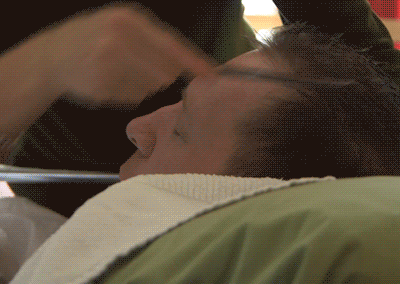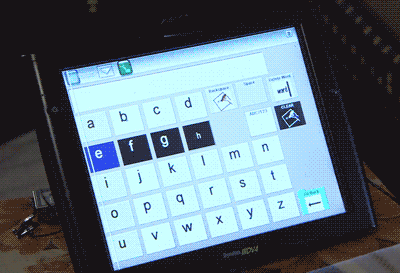CINCINNATI – On February 27, 2014, Gayle Walls made her husband Brett Walls breakfast, went upstairs and never saw the same man again. The last words he said before he slumped over the bannister were "Gayle, I think I'm sick."
At just 51, restaurant manager Brett Walls had a rare and often fatal brainstem stroke, which severed communication between his brain and his body.

He was airlifted to University of Cincinnati Medical Center, where the chief of neurology gave a grim prognosis. The stroke had resulted in a condition called locked-in syndrome: Walls was 100 percent aware and fully engaged, but physically could only blink. The doctor explained that he likely would never get better. At best he would be institutionalized for the rest of his life. The doctor said that if it was what the couple wanted, he would let Brett Walls “slip away."
But Gayle Walls' research uncovered that there were cases of recovery from locked-in syndrome – all of which seemed predicated on early, intensive rehab. But there were no guarantees. Gayle Walls explained the options to her husband.
"I held back tears and turned around occasionally, looking out the window to collect myself," she said. "I told him I hoped that he fought, that I would love him wherever he landed. And I told him that I would support his decision."
Brett chose to fight. As it turned out though, the battle wasn't just with his body; it was with his health insurance.
After several weeks in an intensive care unit, Walls was stabilized and received an assessment from his acute care doctors. They thought inpatient therapy would be helpful, and they wanted to get him into a rehab program as soon as possible.
Gayle Walls, believing this was her husband's only chance for significant improvement, contacted their insurance company, UnitedHealthcare, for authorization to transfer him to a rehab hospital.
"I just thought the fight was basically going to be physical from Brett’s standpoint and me holding it all together on the homefront," she said. "I had no idea that it would ensue a huge fight with the insurance company every step of the way.”
UnitedHealthcare, the country's largest health carrier, denied their request for rehab. Walls' doctors contacted doctors at the insurance company, explaining his progress and the benefits to be gained at an intensive rehab facility. But UnitedHealthcare wouldn't budge. Instead, Gayle Walls said a caseworker gave her a list of nursing homes to consider that weekend. They wanted her husband out of the hospital by Monday.
Gayle Walls
"Your average nursing home would not even get him out of the chair much," said Dr. Richard Harvey, an expert in brainstem strokes at the Rehabilitation Institute of Chicago, a renowned acute rehab center that specializes in locked-in syndrome. "…We've had patients that came in locked in and left walking with canes or walkers. It can happen."

Gayle Walls was determined for her husband to have at least the chance of being one of those patients.
"I look over at Brett and know that somehow I have to find a way to fight the system," she said. "He chose to live, not to exist."
Undaunted, Gayle Walls pushed UnitedHealthcare with four appeals, only to be met with five denials over five months. And with each appeal and each denial, time was slipping away – time that Gayle Walls' research told her was critical if she were to have any chance of getting the man she married back.
UnitedHealthcare said Walls' needs could be met with less-intensive care, without acknowledging the possibility that more-intensive care might lead to recovery. As it explained in its third denial in April:
The [clinical] notes show you had a stroke. Now you can't move. The notes show you cannot care for yourself. You are communicating with eye movements. We see you will learn to use a special power wheelchair. The notes do not show you need to be followed closely by a doctor. Your needs can be met in a less intense care setting. Your health plan guidelines are not met for going to an Acute Impatient Rehabilitation hospital. The denial is upheld.
After more than a dozen emails and phone calls, UnitedHealthcare would only talk to America Tonight off the record. But the company did issue this statement:
Mr. and Mrs. Walls are going through an overwhelming experience and we recognize the serious nature of his condition. From the start, we have reached out to the family to explain and help them understand all of the benefits available under Mr. Walls’ health plan. We continue to be available to help the family locate alternative programs that may assist both Mr. and Mrs. Walls as they move forward with the next step of Mr. Walls’ rehabilitation.
Financially, the year was taking its toll. Brett Walls, of course, couldn't work, nor could his wife as his full-time caregiver. Friends organized local fundraisers and launched a page for them on the crowdfunding site GoFundMe. The Walls' daughter and her family moved in with them to help.
And a local news story last spring on Brett’s plight was spotted by a Cincinnati couple that became an unlikely answer to some of the Walls’ prayers. A quarter of a century ago, Vicki Harris had suffered the same kind of stroke as Brett, and within months got “unlocked.” Her insurance company had covered intensive rehab within three weeks.
"We never had any problems with bills or therapists," said Harris. "And Gayle and Brett have to fight for everything."
After hearing about the Walls' situation, Vicki and her husband Jerry Harris started making the hour-and-a-half round trip two or three times a week to teach Brett Walls exercises they remembered from 25 years ago. With their help, Gayle Walls said her husband started to show improvement: increased range of arm motion, more arm resistance and strength.
But Vicki Harris believes the delay in therapy has pushed Walls' recovery back at least a year.
After five months of denials from UnitedHealthcare, Gayle Walls took her husband’s case to Ohio’s state-run independent medical review board. It reversed UnitedHealthcare’s denial of treatment, ordering intensive inpatient treatment at an acute rehab hospital.
Through sheer will, Gayle Walls secured her husband – more than six months after his stroke – a two-month stay at Chicago's RIC, paid for by UnitedHealthcare. Harvey, the brainstem stroke expert, became his doctor.
In her personal notes, Gayle Walls observed that her husband is responding like a "duck to water in therapy” at RIC.
"Mind you, his injury is profound. He is far from self-sufficient," she wrote. "But he is doing all kinds of things the neurologists at the University of Cincinnati Medical Center said he would never do."
On the Facebook page documenting his recovery, Gayle Walls posted a video last week of her husband driving his new motorized wheelchair down the street. In another video, he bends over from the waist and then lifts himself up straight with no hands for support.
Gayle Walls
"He was told he would never be able to control his head. He was told he would never be able to swallow. They said he’d never be able to do anything but move his eyes up for yes and down for no," said Gayle Walls. "He’s doing so much more. You look at Brett and you know he has a long way to go yet, but he’s on the road.”
Although he wouldn't name names, Harvey said it isn't the first time he's seen insurance companies refuse to pay for services that doctors ordered. And while he couldn't say in Walls' case what could have been accomplished if he'd received acute rehab earlier, he doesn't think Walls will ever return to normal.
“He still has a chance to make some improvements but he’s not at this point going to be walking and taking care of himself in the next two years," Harvey said. "Brett is locked in but that doesn’t mean his life’s over.”

We could only communicate with Walls through a computer interface.
"It's a bitch," said his message board’s voice, as Walls' face transformed from pain to a smile.
Asked how he managed to stay strong through all of it, Walls said through the device: "Prayer."
"I feel I have very little of him," said Gayle Walls. "I miss his voice. I miss our conversations. I miss camping. I miss going out to Mexican every week. It's difficult. I know the man that he is. I know that he's in there. And I know he wants to fight to get out."
After months of waiting, an electric lift to get him and out of bed was finally delivered to the house. Other things, such as a new bed and approval for a new communication device, are starting to appear too, all authorized by UnitedHealthcare.
Gayle Walls is thrilled, but also frustrated.
"When UnitedHealthcare was contacted by your network, suddenly we get an electric lift," she said. "Why should you have to fight? Why should you have to get the media involved? Why do you have to get all over their Twitter and Facebook page? Why? Why? Why? Why? They just rubber stamp, rubber stamp, rubber stamp, rubber stamp, hoping you give up."
In the past month, the Walls have faced a new challenge: Brett Walls' former employer announced it would stop providing health care benefits to its employees, so the Walls had to find a new health care provider. Ironically, they've decided to stick with UnitedHealthcare. Gayle Walls said she finally knows people there who she can contact with questions and that she doesn't want to start all over with a different insurer. As she put it, UnitedHealthcare is the devil they know.
An America Tonight investigation finds dozens of cases of neglect in Arizona’s privatized prison health care system
Knox County, Ohio, saw 377 cases last year after missionaries on a trip to the Philippines contracted the disease
Error
Sorry, your comment was not saved due to a technical problem. Please try again later or using a different browser.